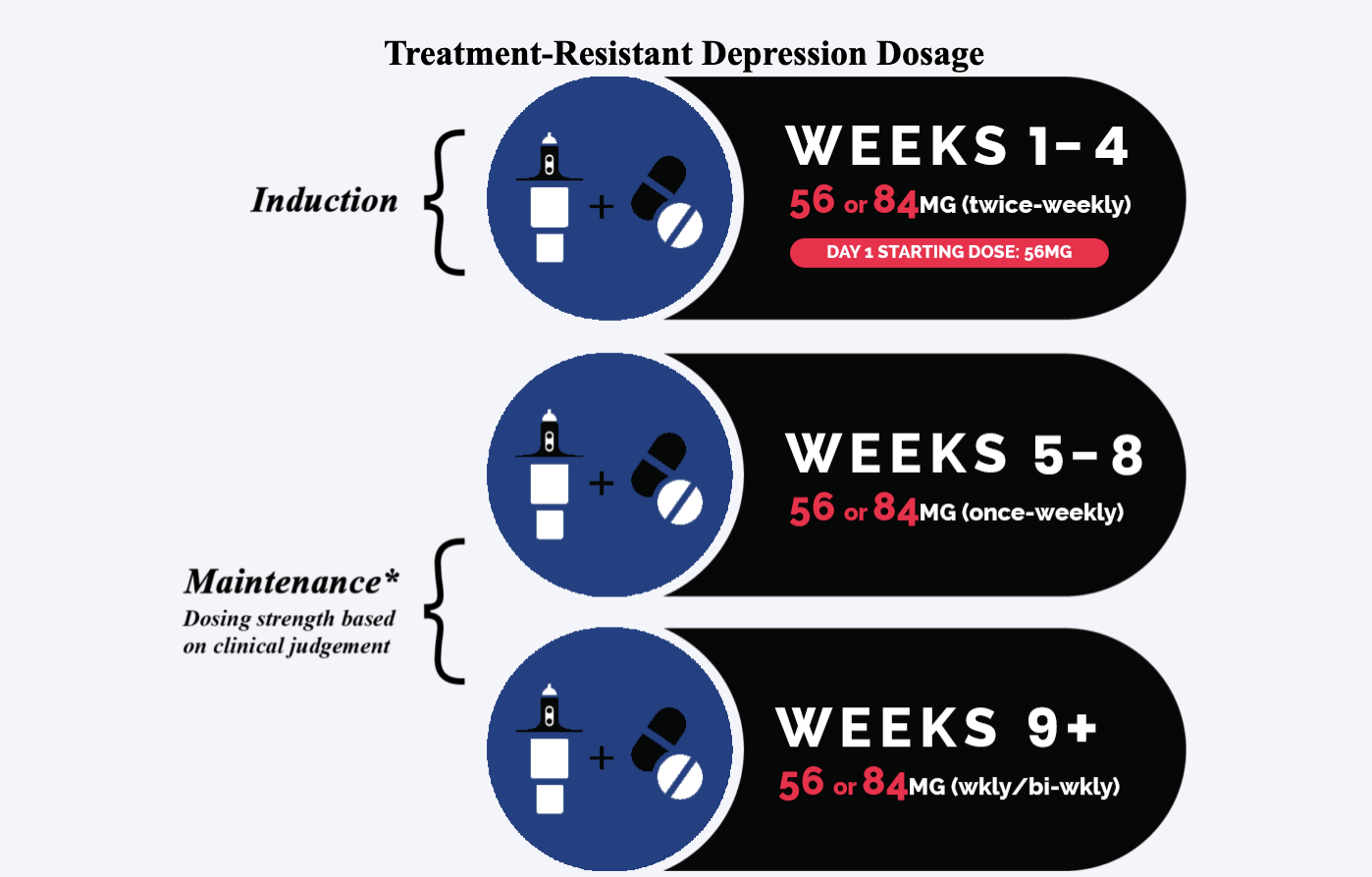
Types Of Ketamine Therapy
The therapeutic approach under consideration entails the intravenous (IV) administration of ketamine within a controlled clinical environment. The administration of ketamine to patients involves the precise calculation of dosage, which is then given intravenously to facilitate swift absorption and optimal therapeutic outcomes. Ketamine infusion therapy is extensively employed in the treatment of treatment-resistant depression, anxiety disorders, post-traumatic stress disorder (PTSD), obsessive-compulsive disorder (OCD), bipolar disorder, and other chronic pain. The therapeutic intervention is commonly administered through a sequence of sessions, with each session typically spanning a duration of approximately 40 to 60 minutes.
Ketamine Infusion Therapy
SPRAVATO™ is a pharmaceutical product including esketamine, administered via nasal spray, and has received approval from the U.S. Food and Drug Administration (FDA) for the explicit purpose of addressing depression that is resistant to conventional treatment methods. This substance is closely related to ketamine and exerts similar effects by selectively modulating NMDA receptors inside the central nervous system. The administration of the treatment occurs within a clinical or medical setting, under the careful oversight of a certified healthcare professional. The nasal spray is self-administered by patients during treatment sessions, which are commonly accompanied with an oral antidepressant as a component of a full treatment regimen.
Intranasal Ketamine (SPRAVATO™)
The administration of ketamine-based prescription medication through the sublingual route entails the placement of a pill, lozenge, or liquid formulation beneath the tongue. The medicine undergoes absorption via the mucous membrane located in the oral cavity, facilitating its quick entry into the circulatory system. This particular mode of administration is a more practical and less intrusive alternative to intravenous infusions, while still offering the potential therapeutic advantages of ketamine. The administration of sublingual ketamine is frequently recommended as a therapeutic intervention for those suffering from treatment-resistant depression, anxiety disorders, post-traumatic stress disorder (PTSD), and chronic pain. It is imperative to acknowledge that the administration of this therapeutic approach necessitates constant supervision by a healthcare practitioner. The healthcare professional assumes the responsibility of monitoring the patient's advancement and appropriately modifying the dosage to achieve the most favorable outcomes.
Sublingual Ketamine

Experience the Healing Potential of
Ketamine Therapy & Spravato™
What is Ketamine?
Ketamine is a medication that has been utilized as an anesthetic for surgical procedures for over five decades. Several studies conducted in the 1990s and early 2000s discovered that ketamine infusion therapy effectively reduced depressive symptoms, especially in patients who had not responded to other treatments. Ongoing research and clinical trials have examined the potential of ketamine as a therapeutic intervention for depression and other mental health disorders, in response to the interest generated by these findings.
Why Ketamine?
Evidence demonstrates that ketamine increases synaptic plasticity by modulating glutamate via actions at the amino-3-hydroxy-5-methyl-4-isoxazolepropionic acid (AMPA) and N-methyl-D-aspartate (NMDA) receptors. It also activates downstream signaling pathways, including brain-derived neurotrophic factor (BDNF) and mechanistic target of rapamycin (mTOR).
Ketamine Functions
Another reason why experts are interested about ketamine is that it works differently than conventional antidepressants. Unlike traditional antidepressants, this medication targets glutamate, the brain's most often used chemical messenger, rather than one of the monoamine neurotransmitters (serotonin, norepinephrine, and dopamine). Glutamate plays a crucial function in the alterations that synapses undergo as part of the learning and memory processes.
Ketamine Infusion Therapy
Typically, ketamine loading doses for mood disorders are administered over two to three weeks with a total of six infusions. Boosters are then administered as needed on a monthly basis.
The loading dose for chronic pain is generally given over three to five consecutive days, followed by booster infusions as required.
While ketamine infusion therapy has shown promise as a treatment for certain mental health conditions with a success rate of 80%, it is important to note that it is not a cure-all and may not work for everyone.
It is also important to carefully consider any potential risks or side effects associated with this treatment, and to discuss them with a healthcare provider before starting treatment.
Spravato is an evidence-based treatment that offers remarkable results for treatment-resistant depression. At MIND PSYCHIATRY, we offer in-office Spravato treatments for people who don’t get the results they need from antidepressants alone. Spravato is a quick-working nasal spray, offering quick relief of depression. It is an option that is typically covered by insurance.
What is SPRAVATO™ (Esketamine)?
SPRAVATO™ (Esketamine) is an innovative medicine that has received approval from the Food and Drug Administration (FDA) and has demonstrated efficacy in alleviating symptoms of treatment-resistant depression in a substantial number of patients. In contrast to conventional antidepressants like Fluoxetine (Prozac) or Sertraline (Zoloft), which selectively modulate neurotransmitters such as serotonin, SPRAVATO™ primarily acts on the NMDA receptor located within neurons, thereby promoting the reestablishment of neuronal connections and facilitating enduring alleviation of symptoms. This innovative therapy, when administered as a nasal spray under the guidance of a certified healthcare professional, has the capacity to mitigate symptoms of depression within a short timeframe. This approach presents a unique alternative and instills newfound optimism for individuals who have encountered challenges in achieving relief through traditional treatment methods. SPRAVATO™ is an innovative solution in the field of depression treatment due to its rapid start of action and unique mechanism, which has the potential to significantly improve the lives of numerous patients.
TREATMENT-RESISTANT DEPRESSION
Depression has a level of complexity that beyond the mere experience of sadness. With a global prevalence of around 300 million individuals, the search for an efficacious remedy for this incapacitating ailment is a formidable obstacle for those who fail to attain alleviation through conventional pharmaceutical interventions. Fortunately, M.I.N.D Psychiatry provides a transformative option known as SPRAVATO™, an FDA-approved esketamine nasal spray that has garnered significant attention in the field. As a registered treatment provider for SPRAVATO™ REMS, our staff is dedicated to addressing the most severe manifestations of treatment-resistant depression, with the purpose of assisting patients in reclaiming their lives and achieving enduring relief from this persistent condition. Place your trust in the knowledge of M.I.N.D Psychiatry and embrace the transformational potential of SPRAVATO™ at present.
Optimized Dosage
Addressing Suicidal Ideation: Tailored Dosage for Major Depressive Disorder
Sublingual ketamine therapy
The sublingual administration of ketamine therapy entails the utilization of a prescription medication containing ketamine, which is presented in the form of a pill, lozenge, or liquid that is inserted beneath the tongue. The medication is absorbed through the mucous membrane of the mouth, allowing it to enter the bloodstream rapidly. This particular mode of delivery is a more convenient and less intrusive alternative to intravenous infusions, while still offering the potential advantages of ketamine therapy. Sublingual ketamine is often prescribed for treating treatment-resistant depression, anxiety, PTSD, and chronic pain conditions. It is crucial to acknowledge that the administration of this therapeutic modality necessitates constant oversight by a qualified healthcare practitioner. This professional will diligently assess the patient's advancements and appropriately modify the prescribed dosage to achieve the most favorable outcomes.







